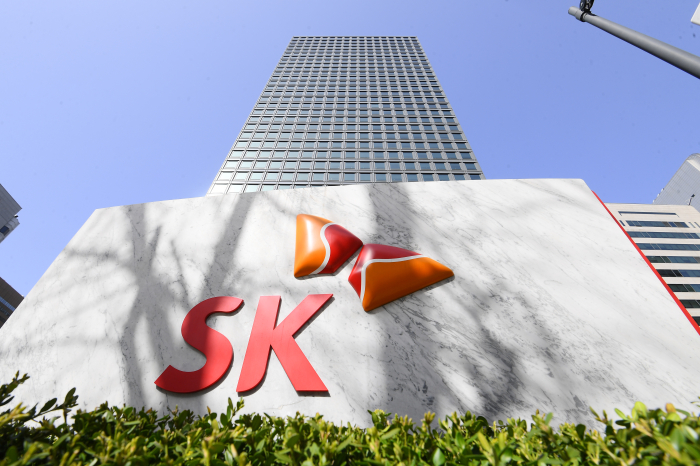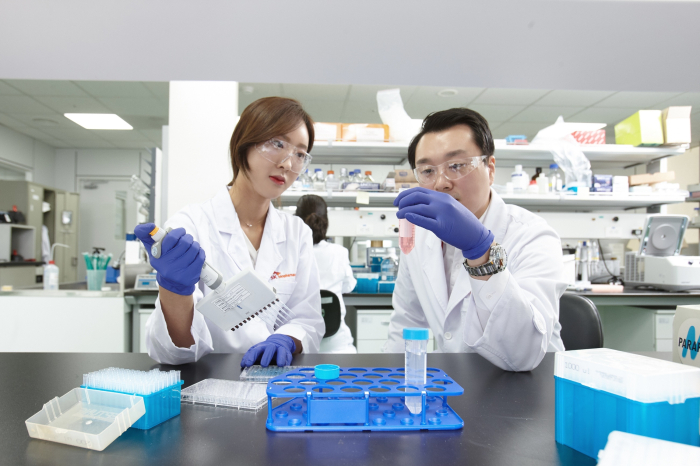SK Group’s 3rd-generation daughter comes to the fore
SK Biopharmaceuticals aims to release its first novel radiopharmaceutical cancer treatment around 2034
By Aug 30, 2024 (Gmt+09:00)
LG Chem to sell water filter business to Glenwood PE for $692 million


KT&G eyes overseas M&A after rejecting activist fund's offer


Kyobo Life poised to buy Japan’s SBI Group-owned savings bank


StockX in merger talks with Naver’s online reseller Kream


Meritz backs half of ex-manager’s $210 mn hedge fund



Chey Yoon-chung, the eldest daughter of SK Group Chairman Chey Tae-won, unexpectedly made her debut during an SK Biopharmaceuticals Co. video conference call on Friday to unveil the drug maker’s medium-to-long-term business roadmap to analysts.
It was the first time for the junior Chey, a third-generation member of the family-run conglomerate, to give a presentation to analysts and directly take questions from them, which lasted about an hour.
The 35-year-old executive, promoted to vice president of SK Biopharmaceuticals in December last year, told analysts that the company aimed to build its leadership in the global radiopharmaceutical therapy (RPT) market by around 2027 by bolstering the pipeline of preclinical drug candidates.
“We’ll secure two additional RPT candidates next year,” she said, adding that the core arm of the country's No. 2 business group is looking to expand into the diagnostic agent market.
The youngest executive of SK Group oversees SK Pharmaceuticals’ in-licensing deals with drug candidate developers. Particularly, she is tightening her grip on RPT, which analysts said would test her management capabilities as a third-generation leader of the conglomerate.

In July, it signed an agreement with the German radiotherapeutics company to join hands to develop and commercialize Full-Life’s RPT compound, dubbed FL-091, into an anti-cancer treatment.
FL-091 is a small-molecule radioligand vector designed to deliver targeted radiation therapy to cancer cells by binding specifically to NTSR1, a receptor protein. The NTSRI is overexpressed in various types of solid tumors, including colorectal cancer, prostate cancer, and pancreatic cancer.
“FL-091 demonstrates enhanced binding affinity (to NTSR1), more than 10 times stronger than that of competing drugs, so it has the high potential to be a best-in-class drug,” said Chey.
SK plans to carry out its preclinical tests in South Korea and then Phase 1 clinical trials at the end of next year.
It will submit investigational new drug (IND) applications to the US and South Korea in the second half of next year to administer the RPT candidate for clinical trials. It aims to release it as a novel therapy around 2034.

Chey joined SK Biopharmaceuticals in 2017. With a master's in biomedical informatics at Stanford University, she has been leading the company’s strategy team since January 2023.
It will boost its pipeline of drug candidates with the cash generated from Cenobamate, its first commercialized drug. The epilepsy treatment received the green light from the US Food and Drug Administration (FDA) in 2019.
By 2032, SK expects Cenobamate, sold under the Xcopri brand in the US, to generate 4 trillion won ($3 billion) in accumulated cash.
Write to Jeong Min Nam at peux@hankyung.com
Yeonhee Kim edited this article.
-
 Bio & PharmaSK Biopharm eyes Asia's No.1 spot in radioactive drug market
Bio & PharmaSK Biopharm eyes Asia's No.1 spot in radioactive drug marketJul 19, 2023 (Gmt+09:00)
2 Min read -
 Bio & PharmaSK Biopharm mulls acquiring firms, drug sales rights in US
Bio & PharmaSK Biopharm mulls acquiring firms, drug sales rights in USJun 07, 2024 (Gmt+09:00)
3 Min read -
 Bio & PharmaKorea’s Celltrion, SK Biopharmaceuticals benefit from direct US sales
Bio & PharmaKorea’s Celltrion, SK Biopharmaceuticals benefit from direct US salesApr 16, 2024 (Gmt+09:00)
3 Min read -
 Bio & PharmaSK Biopharm targets $311 mn for Cenobamate US sales
Bio & PharmaSK Biopharm targets $311 mn for Cenobamate US salesFeb 16, 2024 (Gmt+09:00)
1 Min read -
 Bio & PharmaSK Biopharm gears up to boost epilepsy drug sales in Europe
Bio & PharmaSK Biopharm gears up to boost epilepsy drug sales in EuropeNov 16, 2023 (Gmt+09:00)
2 Min read -
 Bio & PharmaSK Biopharma’s Cenobamate US patent extended by 2032
Bio & PharmaSK Biopharma’s Cenobamate US patent extended by 2032Nov 10, 2023 (Gmt+09:00)
1 Min read -
 PharmaceuticalsSK Biopharm aims to make it to global top 10 healthcare firms by 2030
PharmaceuticalsSK Biopharm aims to make it to global top 10 healthcare firms by 2030Jul 02, 2021 (Gmt+09:00)
1 Min read


